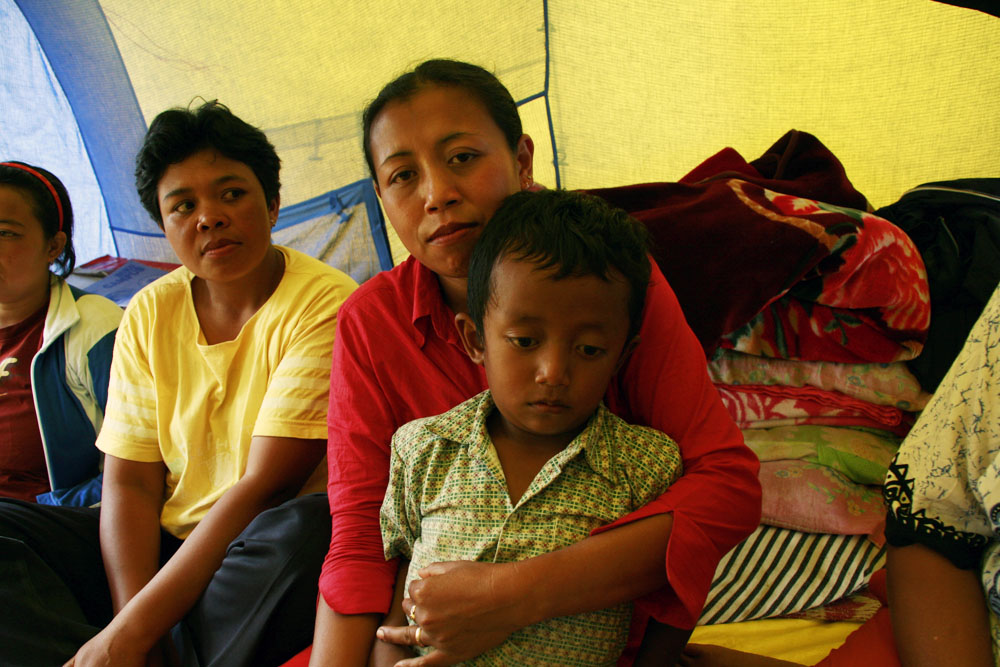One such disaster was a landslide in Bandung district in West Java province on 23 February, which buried more than 40 people and displaced about 1,000.
Three hectares of the Dewata tea plantation in Tenjolaya village, Ciwidey, gave way, creating a mudslide around 10m deep. The search and rescue operation ended on 1 March with 33 people killed and 11 still buried under the mud, according to the National Disaster Management Agency (BNPB).
More than 400 displaced people are now living in camps near the site in makeshift tents that they say are boiling during the day and cold at night. They are receiving rice, noodles and biscuits from the government and Red Crescent Indonesia.
“We need more help,” said Ajat, who has been living in a 3 sqm tent with his wife and two children since the disaster. “I don’t want my family to stay in this tent for too long, but we’re too scared to go back.”
Disaster-prone
Indonesia is the most disaster-prone country in the world, according to the UN Office for the Coordination of Humanitarian Affairs (OCHA); in 2009 alone, it experienced 469 earthquakes with a magnitude of five or higher – more than any other nation.
Some disasters are natural, while others are the result of poor urban planning, a lacklustre enforcement of construction and pollution laws, and environmental degradation.
The most common result is flooding, which has accounted for about 40 percent of Indonesia’s disasters in the past few years, according to government data.
| Impact of floods in Indonesia | ||||||
| 2005 | 2006 | 2007 | 2008 | 2009 | ||
| Numbers killed | 63 | 95 | 137 | 126 | 159 | |
| Numbers affected | 23,962 | 394,430 | 361,821 | 4,892,578 | 5,030,121 | |
| Source: National Disaster Management Agency (BNPB) | ||||||
Amien Widodo, an environmental geologist with the November 10 Institute of Technology in Surabaya city, said heavy rain triggered landslides each year.
“There hasn't been a significant change in rainfall patterns over the past five years. However, floods are lingering for longer, perhaps because of bad infrastructure and clogged drainage,” he told IRIN.
Data from the BNPB since 2005 shows dozens killed every year by floods alone, and tens of thousands affected. About five million people were affected by floods, mostly because of incessant flash flooding in South Kalimantan province, in 2008 and 2009.
Limited capacity
Flooding during the wet season, which generally falls between October and March, costs Indonesia millions in aid and reconstruction.
The government’s budget for flood management this year is 957.2 billion rupiah (US$103 million). Despite this, there is limited capacity to respond to small- and medium-scale disasters.
Laksmita Noviera, an OCHA humanitarian affairs analyst, said local governments were shouldering more responsibility for disaster response because of Indonesia’s increasingly decentralized government.
|
Photo: Angela Dewan/IRIN  |
| Rescuers at the landslide in Bandung district on the last day of efforts to recover survivors on 1 March |
Amin Kuats, a relief team coordinator with Red Crescent Indonesia, said the government and NGOs had less cash and resources for small disasters.
“Big disasters attract more money in donations. In smaller disasters, the aid is mostly provided by the government, and that’s usually not enough,” Amin said.
“Often, if the disaster happens just before local elections, the government will give more aid, but if it happens after, there generally won’t be enough,” he said.
Be prepared
The government says it will conduct an investigation into the landslide disaster in Bandung district to determine whether it was caused by nature, or decades of deforestation.
Survivors said they did not know what to do when the disaster struck, raising questions about preparedness.
“We didn’t know what to do or where to go,” said Wiwin, 30, who is living in a large tent with her husband, four children and four other families. “I looked for my children and then just ran,” she said.
Amin said NGOs were now better prepared to respond quickly to disasters after lessons learned from the 2004 Indian Ocean tsunami that devastated Indonesia’s Aceh province, and last year’s earthquake in West Sumatra.
However, more had to be done in terms of preparedness as well as planning, he said.
“There needs to be more training for these disasters, on the government level and for the people. The government should also understand the land and not allow people to run plantations and build houses in such disaster-prone areas.”
ad/ey/mw
This article was produced by IRIN News while it was part of the United Nations Office for the Coordination of Humanitarian Affairs. Please send queries on copyright or liability to the UN. For more information: https://shop.un.org/rights-permissions




